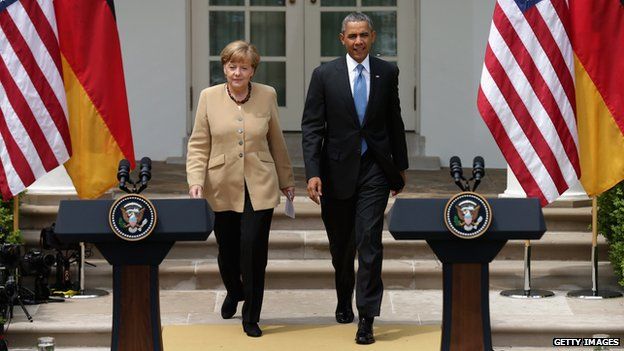PJ Crowley: US-German relations have 'Groundhog Day'
- Published

Recent revelations indicate the US snooped on the communications of German Chancellor Angela Merkel
The United States is experiencing an uncomfortable sequel in its "I Spy" saga with Germany, with new revelations that counter-espionage investigations by Berlin have allegedly uncovered moles within its defence ministry and foreign intelligence service.
The German government retaliated by expelling the CIA station chief, an unusual step that demonstrates how seriously it takes the deepening controversy.
To President Barack Obama and Chancellor Angela Merkel, it must feel like a scene right out of "Groundhog Day".
No matter how hard they work to manage the fallout of compromised intelligence operations and put relations back on track, they are right back where they started, confronting the same questions over again.
The American answer continues to be that countries spy on other countries. The US does. So does Germany.
If a critical function of intelligence agencies is to understand the existing international environment and anticipate how governments are going to respond to future events, it is necessary to find out what world leaders are thinking, saying and doing.
Mr Obama has few close relationships with global counterparts, but the chancellor is an exception.
When the Mrs Merkel cell phone controversy erupted last autumn, the president acknowledged that just because the intelligence community has the capability to undertake specific operations, that doesn't mean it should do so.
US President Barack Obama has vowed to increase transparency in government surveillance efforts
Subsequently, without acknowledging what was done in the past, the White House strongly suggested the future would be different.
Obviously this applied to the chancellor herself, but not the rest of the German government.
As a matter of intelligence tradecraft, it should surprise no one that countries target intelligence operatives or military officers from other countries and pay them for useful information.
That is what intelligence services do.
On the other hand, while Germany understands what spying is, it says it draws a line at best friends.
From Berlin's standpoint, if this is a real partnership, it should enjoy the same level of trust and - in theory - no-spy understanding as exists with other key allies such as Great Britain, Canada, Australia and New Zealand, the so-called "Five Eyes".
Germany and the US have evidently talked about such an agreement, a step Washington has apparently resisted.
But US concerns about strategic differences are overstated.
If the US can maintain its alliance with New Zealand despite profound differences over nuclear matters, it can certainly manage whatever disagreements exist with Germany, a relationship that will only grow more consequential going forward.
Despite significant political pressure, Ms Merkel to her credit has tried to keep the focus on pressing regional matters, particularly the US-European Union standoff with Russia over Ukraine as well as the ongoing nuclear negotiations with Iran.
She did not even bring up the latest spying revelations in her most recent conversation with Obama - a good thing since evidently the White House staff or Director of Central Intelligence failed to alert him before the call.
This is problematic, since it may signal Washington is underestimating the cumulative political impact of the drip-drip-drip of bad news in the relationship with Germany and Europe over the past 10 months.
This is particularly relevant as Washington awaits further European economic sanctions on Russia. Germany will be a pivotal player in whatever the EU decides to do.
The US may be hoping that the truly urgent will trump the temporal - that the EU will recognize why the long-term consequences of the current crisis with Russia matter far more than the short-term implications of the exposure of US intelligence operations.
Russian President Vladimir Putin has faced international sanctions after annexing Crimea
To the professionals, this makes perfect sense, but not necessarily to the broader European public that is currently re-evaluating the nature of relations within Europe and beyond.
The US can't take Germany or Europe for granted. It needs a better answer than "all countries spy".
As Mr Obama himself said in a recent speech at West Point, "when we cannot explain our efforts clearly and publicly, we face… international suspicion, we erode legitimacy with our partners and our people, and we reduce accountability in our own government".
Germany may not qualify to join the Five Eyes, but there needs to be a new understanding regarding intelligence operations that restores an appropriate level of trust in US-German relations.
There should be a pledge on both sides to renew high-level dialogue on these issues as soon as possible.
Meanwhile, Washington should pray for a German win in the World Cup final, certainly deserving after its dominating performance against Brazil.
It would change the subject, at least for a little while.
PJ Crowley is a former US assistant secretary of state and now a professor of practice and fellow at The George Washington University Institute of Public Diplomacy & Global Communication
- Published10 July 2014
- Published1 May 2014
- Published18 November 2013